Understanding Anxiety in Seniors and the Role of Day-Care Environments
Anxiety is a prevalent yet often overlooked concern among older adults, affecting their daily functioning and overall well-being. Senior day-care centers offer a vital platform to implement targeted anxiety reduction techniques. These facilities not only provide social and cognitive stimulation but also serve as a foundation for structured routines, therapeutic activities, and emotional support tailored to seniors' needs. By fostering a safe and engaging environment, day-care programs can effectively mitigate the triggers of anxiety, enhance mental health, and improve quality of life for their participants.
Implementing Relaxation and Mindfulness Techniques in Day-Care Settings
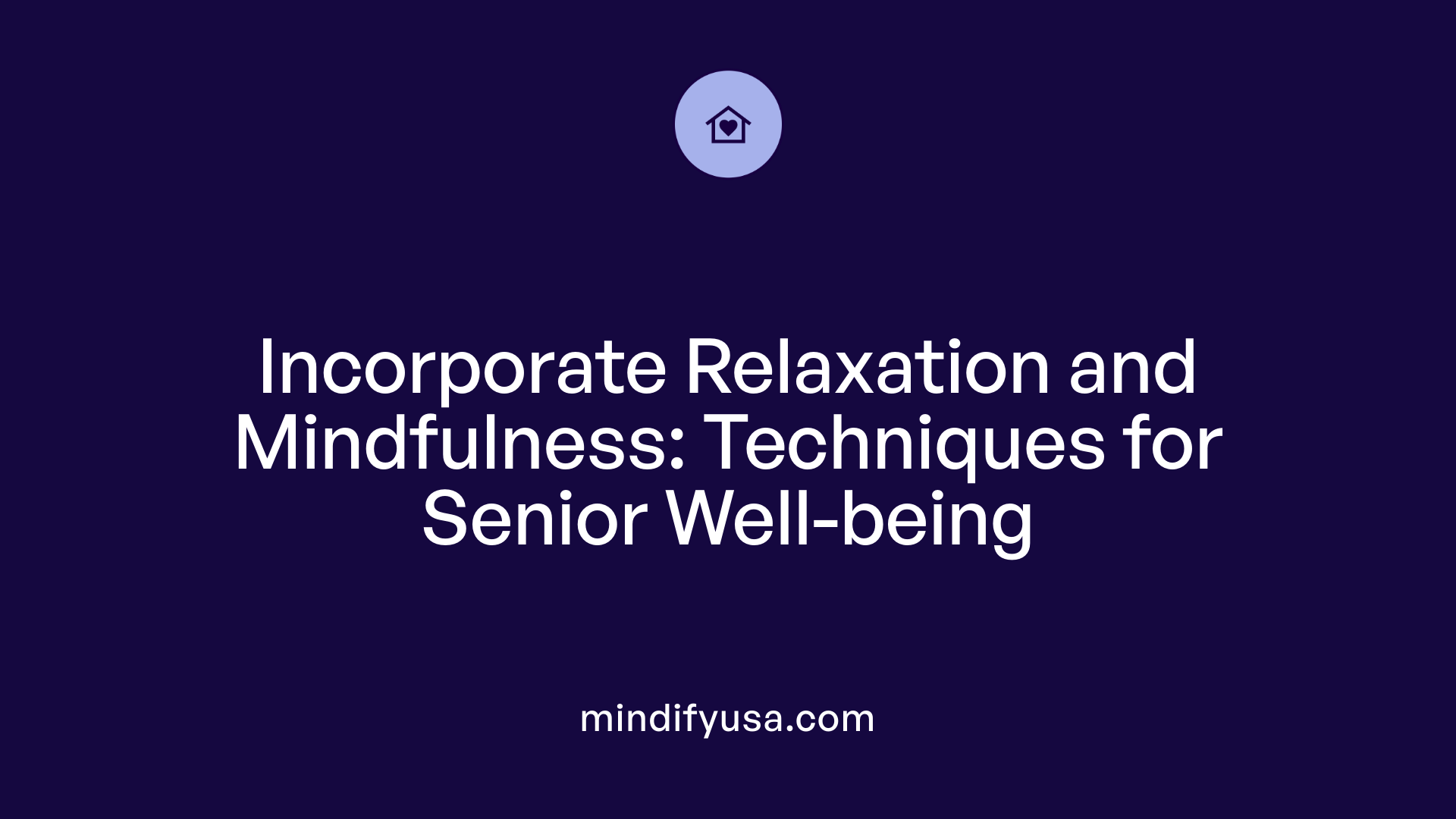
What relaxation techniques and stress management strategies are suitable for seniors?
Seniors benefit greatly from relaxation and mindfulness practices that help reduce stress and promote emotional well-being. Techniques such as deep breathing exercises, guided imagery, mindfulness meditation, and progressive muscle relaxation are especially effective and easy to incorporate into daily routines.
Deep breathing exercises involve slow, deep inhalations through the nose followed by extended exhalations through the mouth. This triggers the body's relaxation response, lowering stress hormones like cortisol and calming the nervous system. Guided imagery uses visualizations of peaceful scenes or positive experiences to distract from worries and foster a sense of calm.
Mindfulness meditation encourages present-moment awareness by focusing on breath, sensations, or sounds, helping reduce anxiety and enhance mental clarity. Mindful walking, often practiced in gardens or indoor hallways, combines gentle movement with attentive breathing, which can soothe agitation and improve concentration.
Progressive muscle relaxation entails tensing and then relaxing different muscle groups, releasing physical tension and fostering a sense of relaxation throughout the body. When combined with gentle physical activities such as yoga, tai chi, or water aerobics, these techniques support both physical and mental health.
Engaging in enjoyable activities, maintaining social interactions, and seeking professional support when needed further improve overall resilience against stress. Aromatherapy with calming scents like lavender or chamomile and listening to soothing music can enhance the calming environment. Incorporating these practices into adult day care not only helps manage seniors’ stress but also enriches their emotional experience, supporting mental resilience.
Enhancing Social Engagement and Peer Support
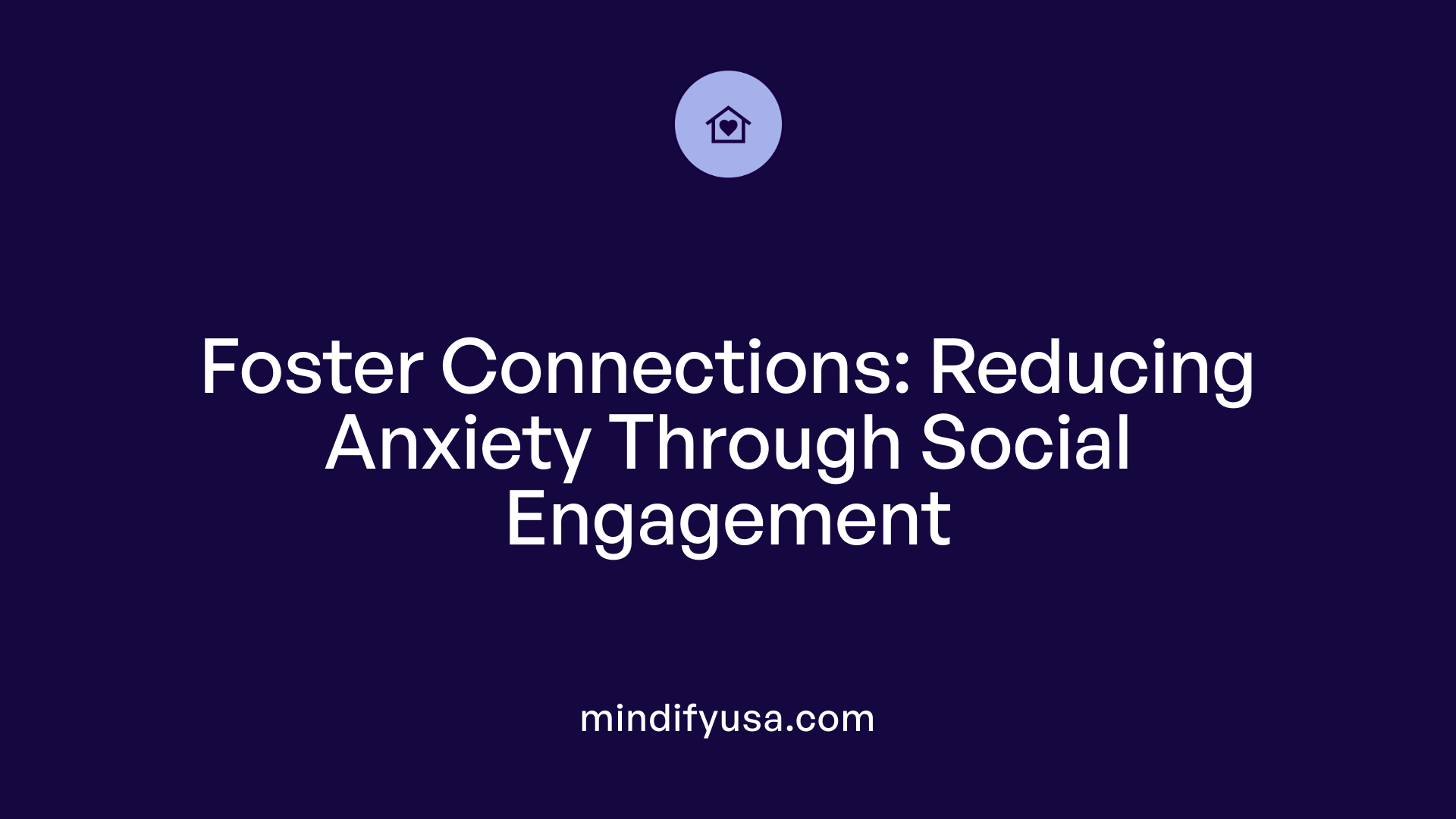
What techniques can help reduce anxiety in senior day-care participants?
Reducing anxiety among seniors in adult day care settings involves several supportive strategies. First, engaging seniors in small group activities allows for personalized attention and meaningful social interaction, which can decrease feelings of loneliness and provide emotional comfort.
Community outings and social events further promote socialization, helping seniors build connections beyond the care environment and fostering a sense of belonging. Encouraging friendships among peers is vital; these emotional bonds can offer ongoing peer support, alleviate fears, and improve overall mood.
In addition, utilizing digital communication tools such as video calls and messaging apps helps maintain connections with family members and friends, especially when in-person interactions are limited. These platforms can enhance social engagement and provide reassurance.
Complementing social activities with relaxation techniques like deep breathing, mindfulness meditation, and progressive muscle relaxation can directly lower anxiety levels. Providing opportunities for physical activity—such as walking, yoga, or tai chi—also elevates mood through endorphin release.
Creating a safe, structured environment with predictable routines and personalized spaces helps seniors feel secure, reducing environmental stressors. Engaging professional support, including counseling or therapy, can further equip seniors with coping skills.
Implementing these techniques creates a comprehensive support network that addresses both emotional needs and social connectivity, significantly contributing to reduced anxiety and improved mental wellbeing among older adults in adult day care.
Developing Routine and Structured Environments
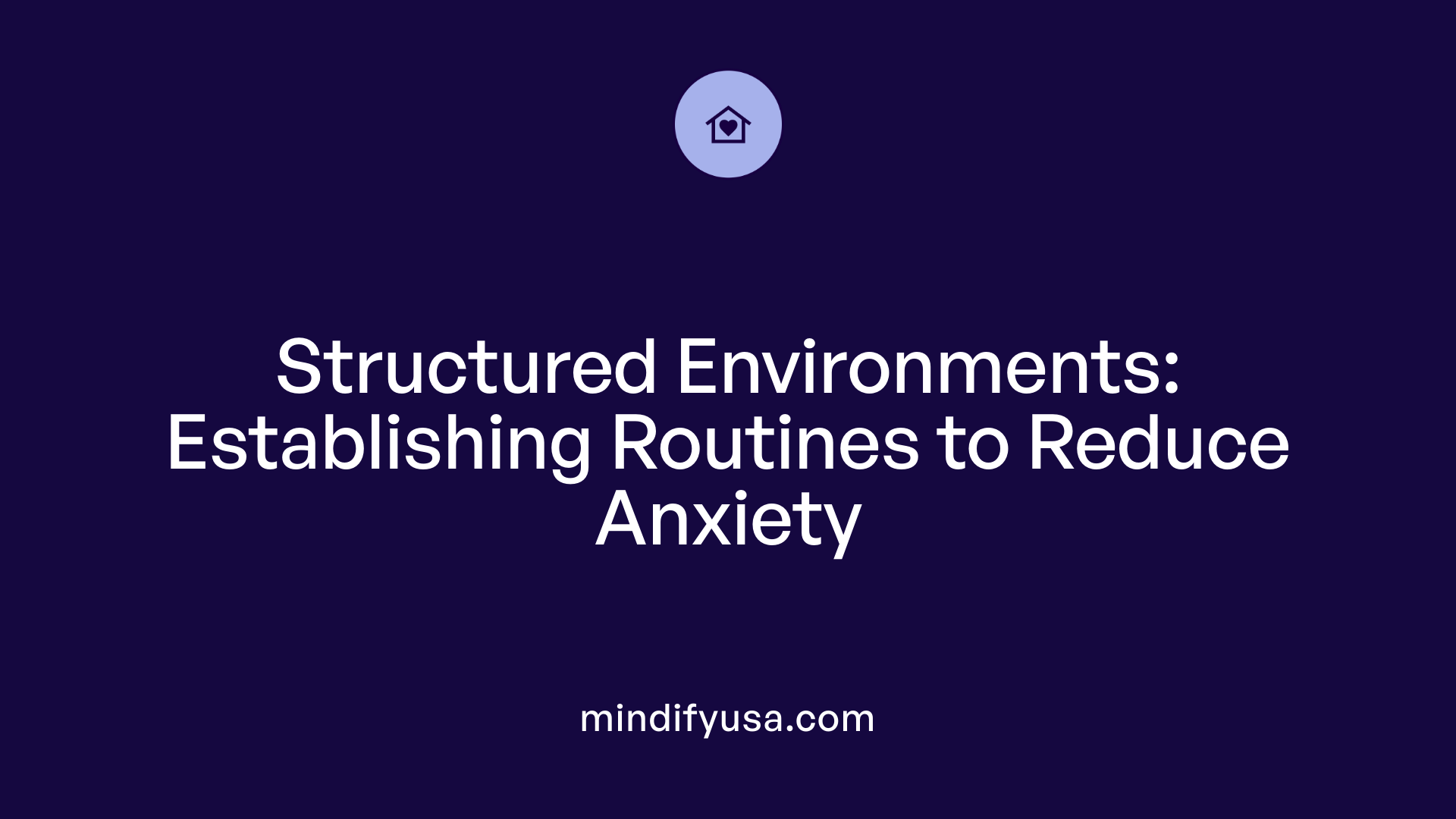
How can senior care environments effectively implement anxiety management programs?
Creating an environment that minimizes anxiety involves establishing a consistent routine and providing clear visual cues. Regular daily schedules help seniors know what to expect, reducing confusion and feelings of insecurity. These routines include predictable times for meals, activities, and rest, which foster a sense of stability.
Visual cues such as signage, clocks, and labeled rooms support orientation, especially for residents with cognitive impairments. Personalized spaces, with familiar objects and calming elements like soft lighting and comfortable furniture, further enhance comfort and reduce stress.
Reality Orientation Therapy is an essential component in managing anxiety within senior care settings. It involves frequent reminders of current information—such as time, date, and location—and reinforcing residents’ personal identities. Daycare programs trained in dementia care incorporate personalized Reality Orientation techniques, using visual cues and group discussions to help residents stay connected with their environment.
To effectively implement these programs, staff training on recognizing anxiety symptoms and delivering person-centered care is crucial. Evidence-based relaxation activities like breathing exercises, mindfulness, and cognitive-behavioral techniques can be integrated into daily routines.
Moreover, fostering social interactions through group activities and encouraging peer support play significant roles in reducing feelings of loneliness, which often heighten anxiety. Access to mental health professionals, including therapists and pastoral care providers, enhances personalized support.
Finally, policies that promote continuous staff education and well-being, along with environmental modifications aimed at calming and familiarizing residents, contribute to a comprehensive anxiety management strategy. This holistic approach helps residents feel safe, supported, and engaged, ultimately improving their overall quality of life.
| Strategy | Implementation Example | Purpose |
|---|---|---|
| Consistent routines | Fixed schedule for meals and activities | Reduce confusion and promote stability |
| Visual cues and signage | Labeled rooms and clocks | Aid orientation and independence |
| Personalized spaces | Familiar objects and calming decor | Enhance comfort and emotional safety |
| Reality Orientation | Frequent reminders and discussions | Decrease disorientation and anxiety |
| Relaxation techniques | Guided breathing, mindfulness | Lower stress levels and promote calmness |
| Social engagement | Group activities and peer support | Combat loneliness, support mental health |
| Professional mental health support | Therapy and pastoral care | Provide individualized emotional support |
Implementing these strategies in a coordinated manner helps senior care environments foster a supportive, predictable, and calming atmosphere—vital factors in effective anxiety management.
Supporting Seniors with Cognitive Impairment and Dementia
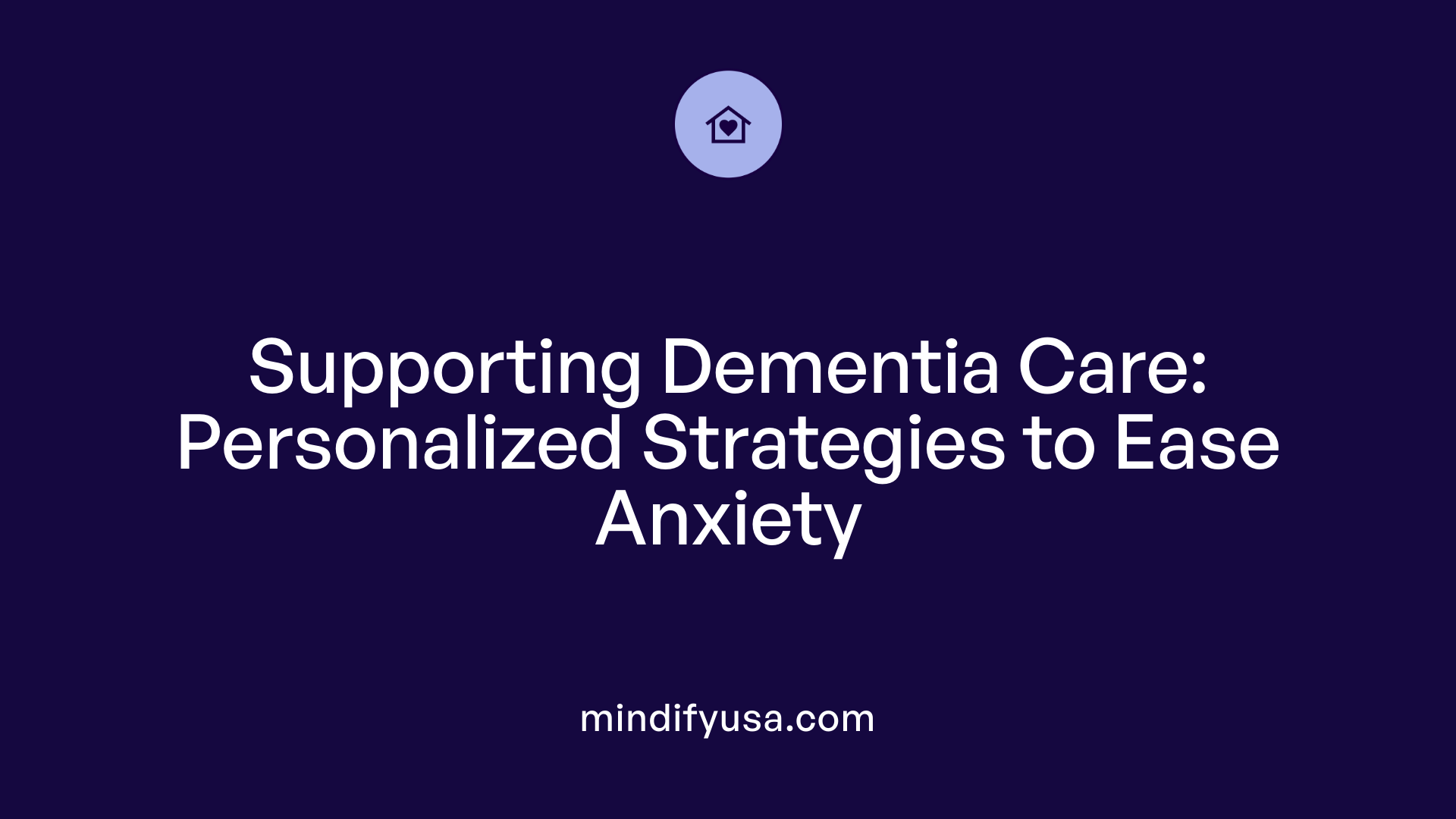
What support strategies are effective for seniors experiencing anxiety, including those with cognitive decline or dementia?
Helping seniors manage anxiety, especially those with cognitive impairment or dementia, requires a combination of thoughtful activities and environmental adjustments. Tailoring activities to match their cognitive levels is essential. For example, simple, familiar routines help reduce confusion and provide a sense of security.
Using techniques like reality orientation and validation can significantly ease disorientation. Reality orientation involves regular reminders about the current time, location, and personal identity. This regular reinforcement can decrease anxiety and promote understanding of their surroundings.
Creating a familiar setting is another critical aspect. Personalizing rooms before residents arrive, maintaining consistent routines, and using visual cues help foster a sense of stability. Small group activities and safe environments that minimize overstimulation are also beneficial in reducing agitation and stress.
Involving family and caregivers is vital. Providing them with education on communication strategies and reassurance techniques can improve interactions and support emotional health. Additionally, family engagement in meaningful activities offers comfort and strengthens their connection.
Incorporating relaxation exercises—like deep breathing, guided imagery, or gentle massage—can help lower stress levels. Physical activities such as walking, yoga, or tai chi release endorphins, natural mood enhancers that combat anxiety.
When anxiety is persistent or severe, consulting healthcare professionals for medication or therapy is recommended. Approaches like cognitive-behavioral therapy adapted for seniors can be effective, especially when combined with a supportive environment.
By addressing the physical, emotional, and environmental needs of seniors with dementia, care providers can help reduce anxiety and improve overall well-being, fostering a comforting and engaging atmosphere.
Utilizing Evidence-Based Psychosocial and Therapeutic Interventions
What evidence-based approaches are recommended to alleviate anxiety in seniors attending day-care programs?
To effectively reduce anxiety among seniors in day-care settings, professionals often turn to a variety of research-supported psychosocial and therapeutic methods. Cognitive-behavioral therapy (CBT) stands out as a gold standard, especially for treating generalized anxiety and related disorders in older adults. This approach helps seniors identify and challenge negative thought patterns, develop coping strategies, and gradually face anxieties in a controlled environment.
Beyond individual therapy, group-based activities that foster social interaction are vital. These groups help combat loneliness and reduce feelings of social disconnection, which are common triggers for anxiety. For example, peer support groups or group therapy sessions focused on emotional well-being provide shared understanding and encouragement.
An integrated care model that seamlessly combines mental health support with physical and social services can boost outcomes. The 4Ms framework—What Matters, Medication, Mentation, and Mobility—guides comprehensive care aimed at addressing all relevant factors contributing to anxiety.
Incorporating mindfulness practices such as meditation, breathing exercises, and gentle yoga can further aid seniors in managing stress. These techniques promote relaxation, enhance awareness, and help reduce physiological symptoms of anxiety.
Lifestyle strategies—like maintaining good sleep hygiene, engaging in physical activity, and limiting stimulants such as caffeine—also support mental health. For some seniors, medication, when carefully managed, can be an adjunct to therapy, helping control anxiety symptoms without undue side effects.
Overall, a multifaceted approach that combines evidence-based therapies, supportive social environments, and lifestyle adjustments offers the most promising way to ease anxiety in seniors participating in adult day care programs.
Supporting Caregiver Well-being and Respite Care
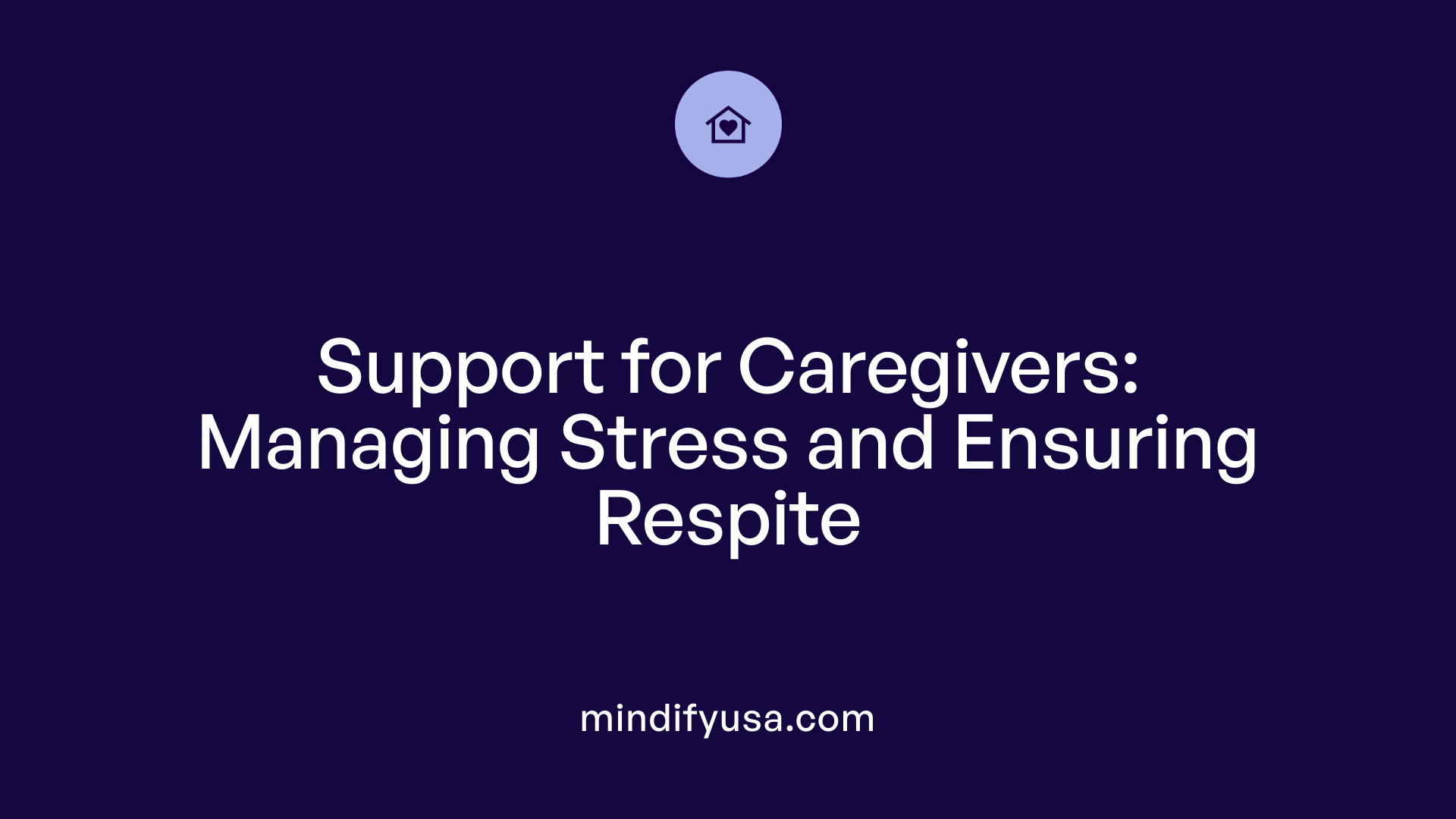
How can caregivers and professionals manage stress and anxiety in their work with seniors?
Caregivers and professionals working with older adults often face demanding emotional and physical challenges. To manage stress and anxiety effectively, self-care is essential. This includes maintaining a balanced diet, engaging in regular physical activity like walking or yoga, ensuring adequate sleep, and practicing relaxation techniques such as deep breathing, guided meditation, or mindfulness exercises.
Building a strong support network is equally important. Support groups, community resources, and relationships with family and friends provide emotional backing and practical advice. These connections help reduce feelings of isolation and offer reassurance during demanding times.
Utilizing respite care options is vital to prevent burnout. Respite services give caregivers a short-term break from their duties, allowing time for rest, errands, or personal activities. Access to professional training on stress management and dementia care also boosts confidence and competence, reducing anxiety related to difficult situations.
Early recognition of stress signs—such as irritability, fatigue, or sleep disturbances—is crucial. Seeking help from mental health professionals when needed ensures caregivers maintain their well-being, ultimately enhancing the quality of care provided to seniors.
Fostering an Environment of Psychological Safety and Ongoing Support
Effective anxiety reduction in senior day-care participants hinges on comprehensive, tailored strategies that encompass relaxation, social engagement, structured routines, and professional support. Creating a secure, predictable environment complemented by personalized activities helps seniors feel more in control and less anxious. Incorporating evidence-based psychosocial interventions and ongoing staff training enhances the quality and responsiveness of care. Engagement with families and caregivers as partners in care, along with accessible mental health resources, further reinforce mental resilience. By prioritizing mental wellness and fostering a compassionate, education-driven atmosphere, senior day-care centers can significantly improve participants' emotional health and overall quality of life.
References
- Adult Day Care Services - HelpGuide.org
- How to Help Seniors Manage Anxiety and Depression
- Strategies to support older adults' mental health during the transition ...
- The Benefits of Small Group Settings for Adult Day Programs
- Supporting Seniors with Adult Day Care
- Elder Care- Senior Relaxation Tips to Reduce Anxiety and Worry
- Management of Anxiety in the Elderly - Village at Duxbury
- Factors inhibiting social activities among adult daycare users - PMC
- 6 Ways to Calm Anxiety in Elderly - The GreenFields Continuing Care






































































































